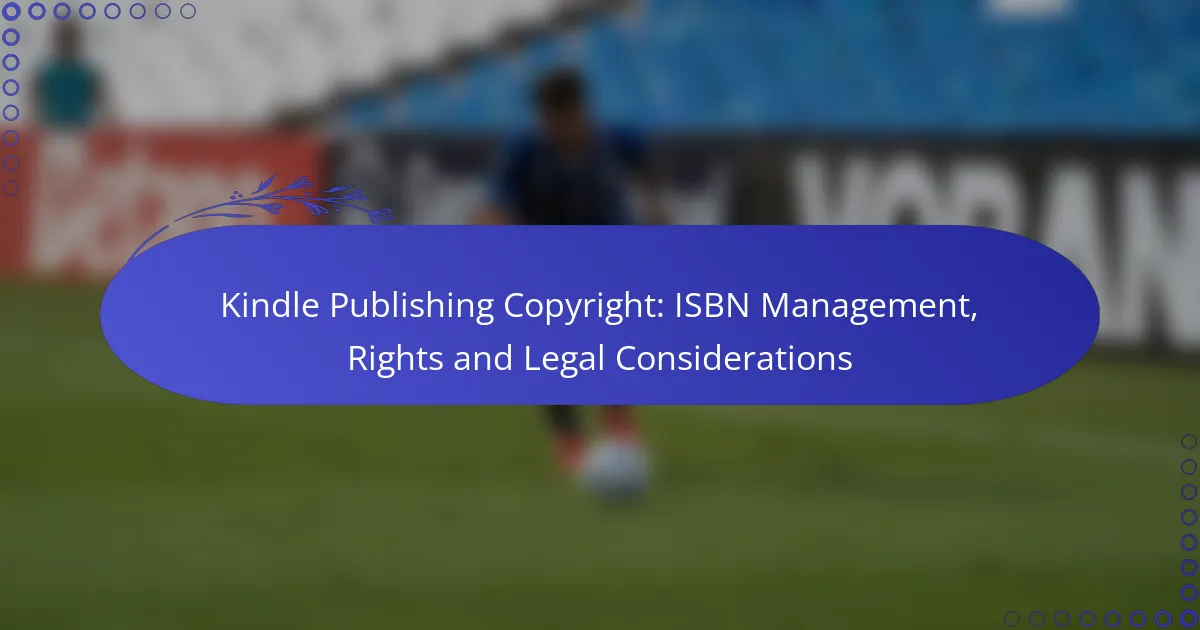In the realm of Kindle publishing, managing ISBNs is essential for effective distribution and sales tracking, as these identifiers help ensure your books are easily recognized in the marketplace. Additionally, understanding copyright is crucial for authors to protect their original works and maintain control over reproduction and distribution. By familiarizing yourself with copyright laws and implementing protective measures, you can safeguard your intellectual property and enhance your publishing success.
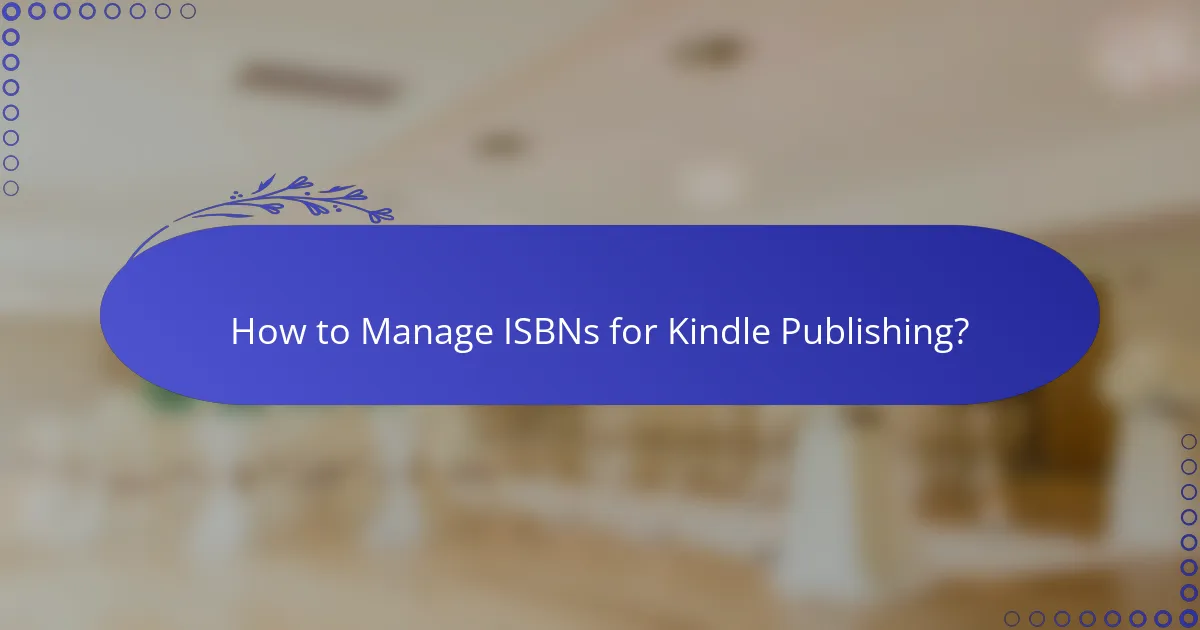
How to Manage ISBNs for Kindle Publishing?
Managing ISBNs for Kindle publishing involves obtaining, assigning, and tracking these identifiers for your books. An ISBN (International Standard Book Number) is crucial for distribution and sales tracking, ensuring your titles are easily identifiable in the marketplace.
Obtain ISBN through Amazon KDP
Amazon Kindle Direct Publishing (KDP) offers a free option to obtain an ISBN for your eBook. When you publish your book through KDP, you can choose to let Amazon assign an ISBN, which simplifies the process for self-publishers.
Using KDP’s free ISBN means you won’t own the ISBN, as it will be registered to Amazon. This is suitable for authors who plan to sell exclusively on Amazon and do not need the ISBN for other platforms.
Purchase ISBN from Bowker
If you prefer to own your ISBN, you can purchase one from Bowker, the official ISBN agency in the United States. Prices typically range from around $125 for a single ISBN to lower per-unit costs when buying in bulk.
Owning your ISBN allows you to control how your book is distributed across various platforms and retailers. This is particularly beneficial if you plan to sell your book outside of Amazon or in multiple formats.
Assign ISBN to multiple formats
When publishing a book in different formats, such as eBook, paperback, and hardcover, each format requires a unique ISBN. This helps retailers and libraries track inventory and sales accurately.
For example, if you have an eBook and a paperback version of the same title, you will need two separate ISBNs. Ensure you assign the correct ISBN to each format to avoid confusion during distribution.
Track ISBN usage
Tracking the usage of your ISBNs is essential for understanding sales performance and inventory management. You can monitor sales through your publishing platform, such as Amazon KDP, which provides sales reports linked to your ISBNs.
Consider maintaining a spreadsheet to log each ISBN, the corresponding book format, and sales data. This will help you analyze trends and make informed decisions about future publications and marketing strategies.

What Are the Copyright Considerations for Kindle Authors?
Kindle authors must understand copyright to protect their original works and manage their rights effectively. Copyright grants exclusive rights to authors, allowing them to control the reproduction and distribution of their content.
Understanding copyright ownership
Copyright ownership typically belongs to the author of the work, meaning you hold the rights to your Kindle book as soon as it is created and fixed in a tangible medium. If you collaborate with others, clarify ownership agreements to avoid disputes later.
In cases where you hire freelancers for editing or cover design, ensure contracts specify that you retain copyright for the final product. This prevents any potential claims from contributors regarding ownership of the work.
Registering copyright with the U.S. Copyright Office
While copyright protection is automatic upon creation, registering your work with the U.S. Copyright Office provides additional legal benefits. Registration allows you to file a lawsuit for infringement and can enhance your ability to recover damages.
The registration process involves completing an application and paying a fee, which typically ranges from $35 to $55. You can register online, making it a straightforward step for Kindle authors to secure their rights.
Duration of copyright protection
In the United States, copyright protection for works created after January 1, 1978, lasts for the life of the author plus 70 years. For works created by multiple authors, the duration extends to 70 years after the last surviving author’s death.
For works published before 1978, copyright lasts for 95 years from the date of publication. Understanding these durations is crucial for planning the future use and potential licensing of your Kindle books.
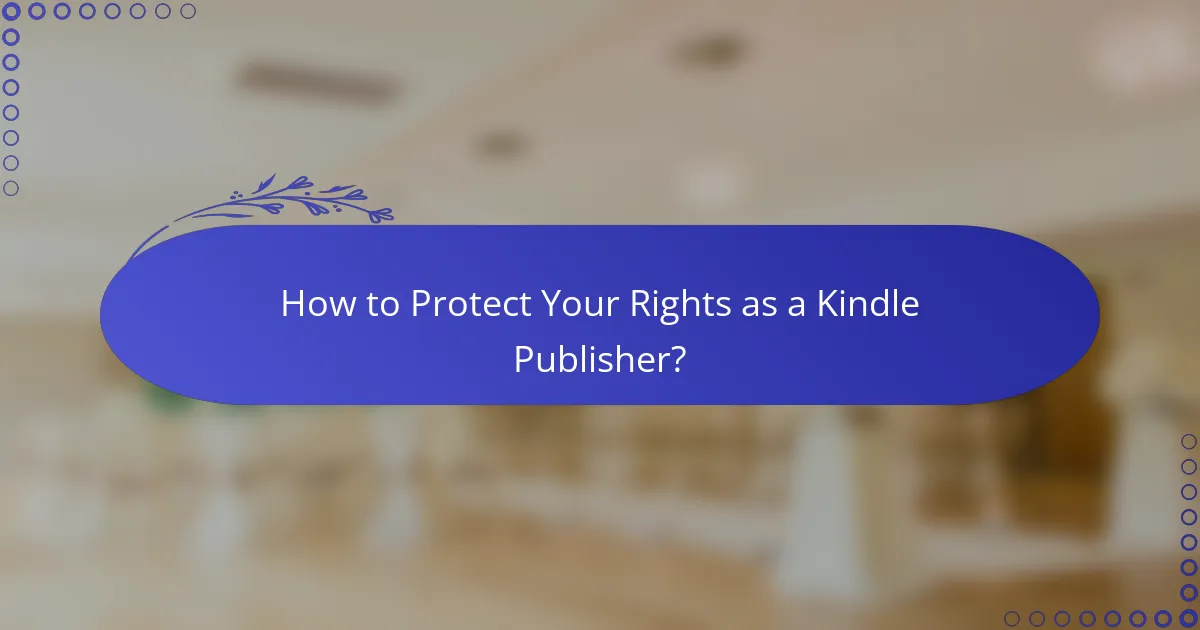
How to Protect Your Rights as a Kindle Publisher?
To protect your rights as a Kindle publisher, you should understand copyright laws, utilize copyright notices, and enforce your rights effectively. These steps help safeguard your intellectual property and ensure you maintain control over your published works.
Use of copyright notices
Including a copyright notice on your Kindle publications is a straightforward way to assert your ownership. A typical notice includes the © symbol, the year of publication, and your name or the name of your publishing entity. For example, © 2023 John Doe.
This notice serves as a public declaration of your rights and can deter unauthorized use of your work. While copyright protection exists automatically upon creation, a visible notice reinforces your claim and can be beneficial in legal disputes.
Enforcement of rights
Enforcing your rights as a Kindle publisher involves monitoring the use of your work and taking action against infringement. This can include sending cease-and-desist letters to unauthorized users or filing Digital Millennium Copyright Act (DMCA) takedown notices if your work is used without permission online.
It’s essential to keep records of your publications and any unauthorized uses. If you face significant infringement, consider consulting a legal professional who specializes in intellectual property to explore further options.
Understanding fair use
Fair use is a legal doctrine that allows limited use of copyrighted material without permission under specific circumstances. This can include commentary, criticism, news reporting, teaching, or research. However, fair use is not a blanket protection and is determined on a case-by-case basis.
As a Kindle publisher, it’s crucial to understand the boundaries of fair use to avoid potential legal issues. If you’re unsure whether your use qualifies as fair use, seek legal advice to clarify your position and protect your rights effectively.
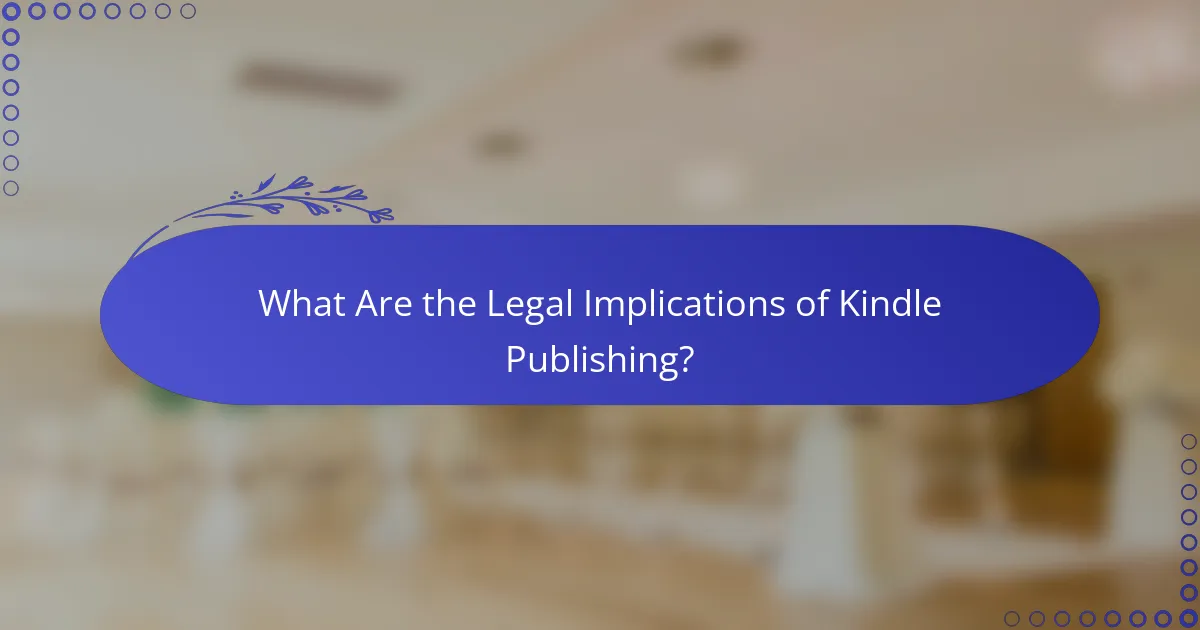
What Are the Legal Implications of Kindle Publishing?
Kindle publishing carries several legal implications, primarily concerning copyright, content liability, and adherence to platform policies. Authors must navigate these areas carefully to avoid potential legal disputes and ensure compliance with relevant laws.
Liability for content infringement
When publishing on Kindle, authors are responsible for ensuring that their content does not infringe on the copyrights of others. This includes avoiding the use of copyrighted images, text, or any other materials without proper permission. If an infringement occurs, the author may face legal action, which can result in financial penalties or the removal of their work from the platform.
To mitigate risks, authors should conduct thorough research on their content and consider using royalty-free or licensed materials. Keeping records of permissions and licenses can also provide protection in case of disputes.
Compliance with Amazon’s policies
Amazon has specific guidelines that all Kindle publishers must follow, including rules about content quality, originality, and prohibited content types. Non-compliance can lead to the suspension of publishing privileges or removal of books from the Kindle store. Authors should familiarize themselves with Amazon’s Kindle Direct Publishing (KDP) guidelines to ensure their work meets all requirements.
Regularly reviewing these policies is essential, as they can change. Authors should also be proactive in addressing any feedback or issues raised by Amazon to maintain their publishing status.
Understanding international copyright laws
Copyright laws vary significantly across countries, impacting how authors publish and protect their work globally. While the Berne Convention provides a framework for international copyright protection, individual countries may have specific regulations that authors must consider. For instance, the duration of copyright protection can differ, affecting how long an author retains rights to their work.
Authors should research the copyright laws relevant to their target markets and consider registering their works in those jurisdictions if necessary. Consulting with a legal expert in intellectual property can provide valuable insights into navigating these complexities effectively.

What Are the Best Practices for ISBN Management?
Effective ISBN management involves keeping accurate records, regularly updating information, and leveraging ISBNs for marketing purposes. These practices ensure that your book is properly cataloged and easily discoverable by readers and retailers.
Keeping records of ISBN assignments
Maintaining detailed records of ISBN assignments is crucial for tracking your publications. Create a spreadsheet or database that includes the ISBN, title, author, publication date, and format (e.g., eBook, paperback). This organized approach helps prevent duplication and ensures that each version of your book is correctly identified.
Consider using a unique identifier for each edition or format of your book. For instance, if you publish both a hardcover and an eBook version, assign separate ISBNs to each to avoid confusion in sales and distribution channels.
Updating ISBN information
Regularly updating your ISBN information is essential, especially when there are changes to your book’s details, such as a new edition or a change in publisher. Notify the ISBN agency of any updates to ensure that your book’s metadata remains accurate in databases and catalogs.
Keep in mind that if you change the title or format of your book, you will need to assign a new ISBN. This ensures that retailers and libraries can easily find the correct version of your work.
Using ISBNs for marketing
ISBNs can play a significant role in your marketing strategy by enhancing discoverability. Use your ISBNs in promotional materials, online listings, and social media to help potential readers find your book easily. Including the ISBN on your website can also facilitate direct sales.
Additionally, consider using ISBNs to track sales data across different platforms. By analyzing which formats or editions sell best, you can refine your marketing efforts and focus on the most successful channels.
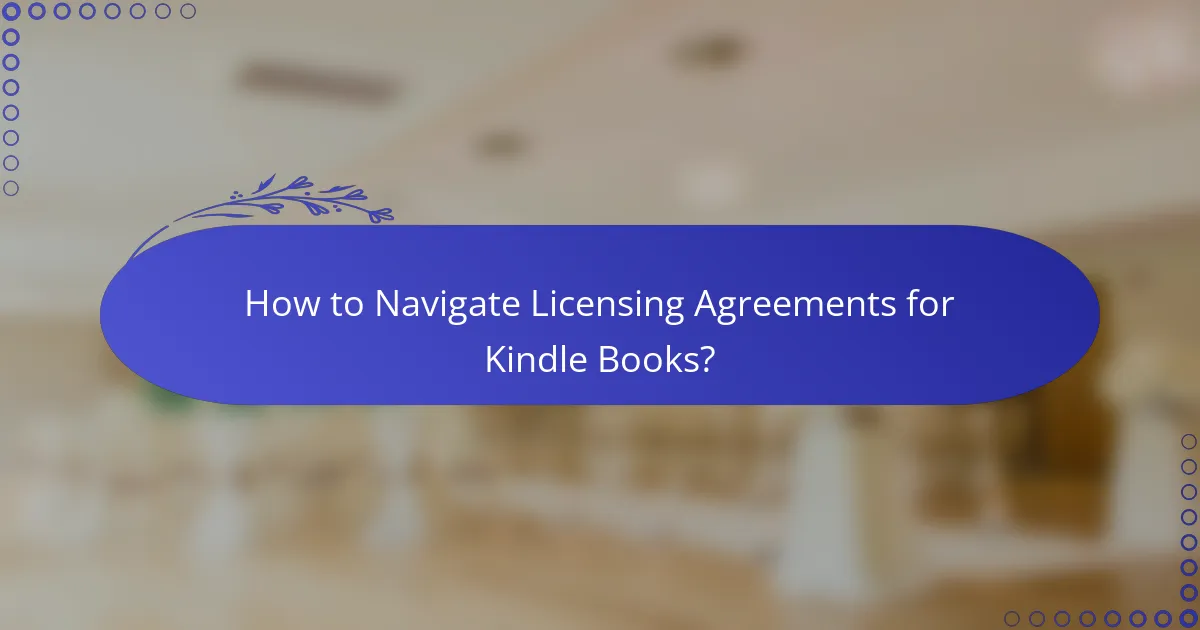
How to Navigate Licensing Agreements for Kindle Books?
Navigating licensing agreements for Kindle books involves understanding the rights you grant and retain when publishing. These agreements dictate how your content can be used, shared, and sold, impacting your control and potential earnings.
Types of licensing agreements
There are several types of licensing agreements that authors can encounter when publishing Kindle books. The most common include exclusive licenses, non-exclusive licenses, and distribution agreements.
An exclusive license grants one party the sole rights to publish and distribute your work, often resulting in higher royalties but limiting your ability to publish elsewhere. In contrast, a non-exclusive license allows you to license your work to multiple parties, increasing your reach but potentially lowering individual royalty rates.
Distribution agreements typically involve a third party, such as a publisher or distributor, who manages the sale of your book. It’s crucial to read these agreements carefully to understand the terms, including payment structures and rights reversion clauses.
